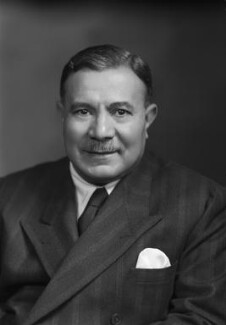
Salih Jabr
Sayyid Salih Jabr (Arabic: سيد صالح جبر; 1896–1957) was an Iraqi statesman who served as the prime minister of Iraq from March 1947 to January 1948.[1] Jabr was the first Shi'i Muslim to become the prime minister of his country and throughout his career held several offices around the country such as the office of minister of justice, education, foreign affairs, interior, and finance.
Salih Jabr
1896
1957 (aged 60–61)
2
Prime Minister of Iraq[edit]
In March 1947, Regent 'Abd al-Ilah entrusted Jabr with the mission of establishing a new government,[13] and with the support of Nuri Pasha for his candidacy, Jabr achieved establishing a new government.[14] Jabr, now Prime Minister and accompanied by Nuri Pasha, initiated talks with the United Kingdom regarding the renegotiation and revision of the Anglo-Iraqi Treaty of 1930. They were conducted in secret, for fear of the outbreak of riots and the mobilization of the political organizations that demanded the immediate departure of British influence from Iraq. Only the final paragraphs of the new treaty were made public and were referred to as the "Treaty of Portsmouth" when it was signed in 1948.[13][15] The agreement concluded on 15 January 1948 provided for the withdrawal of British troops from Iraq and the transfer of British air bases to Iraq, with the provision that in the event of war, the UK could regain them. In matters of army supplies and training, Iraq was to remain tied to London, and the country's army development projects were to be supervised by a joint Iraqi-British commission. The agreement was to be valid for only 25 years.[13]
The treaty's terms were considered only slightly better than the extremely unpopular treaty of 1930.[16] But despite that, it caused great outrage in Iraq, which was the cause of demonstrations of thousands of Iraqis. The uprisings were called the al-Wathbah Uprisings.[17] Students in Baghdad, and later workers, would stage strikes and stage daily demonstrations on al-Rashid Street. Jabr returned from England to Iraq but was forced to land at the Royal Air Force base at al-Habbaniyya, and return to Baghdad in a disguise. On 26 January 1948, Jabr ordered the police to use machine guns against the protestors,[18] not aware of the large and seriousness of the issue.[15] The police would eventually shoot protestors trying to cross al-Ma'mun Bridge from armored police cars. Up to three to four hundred people were killed as a result. The situation was made worse and Iraqi poets like al-Jawahiri, who's brother was killed in the massacre and delivered a poem condemning the shooting at the Haydar-Khana Mosque to a crowd of Iraqis, and al-Sayyab kept the anti-British demonstrations active.[19]
Despite that, Jabr initially insisted on signing the treaty when returning to Iraq.[20] But once the army massacred several protestors in the al-Ma'mun Bridge demonstration,[13] two ministers left the government in protest against the massacre and Abd al-Ilah demanded the resignation of Jabr without him signing the treaty. Jabr would announce that he would not sign the negotiated agreement and had to repudiate it but was accused of treason and attacked even more aggressively by several Iraqi politicians. he left office twelve days after the content of the treaty was announced. After Jabr, Sayyid Muhammad al-Sadr, a veteran politician, succeeded him in becoming Prime Minister,[13] while Jabr fled from Baghdad to Jordan and then later to England. His resignation caused celebrations in Baghdad.[18][20]
Later career[edit]
Salih Jabr did not completely lose his political influence in Iraq, and in the June 1948 Iraqi parliamentary election, he elected many people from his circle as deputies.[21] The following year, Jabr, alongside these deputies, joined the Constitutional Union Party, founded by Nuri Pasha.[22] Jabr himself took up the position of Minister of Interior for the third time in the government of Tawfiq al-Suwaidi. This government lasted until September 1950. Jabr, as a minister, again fell victim to sectarianist issues when he was criticized by Sunni Muslims and accused of corruption and enforcing his doctrine on them. Noticing this backlash even within the Constitutional Union Party, Jabr eventually left the party and formed the Socialist Nation Party, originally called the "Socialist People's Party." Its program was addressed to workers and the younger intellectual class, as well as to Muslims of Shi'i origin from the villages on the Euphrates River, who had already supported Jabr before.[23]
Over time, Jabr became one of the biggest critics of Nuri Pasha al-Said and supporters of electoral reform, enabling his fight against abuse and fraud.[23] However, the opposition's activities did not bring the intended results. In the face of demonstrations inspired by these activities, the regent agreed to electoral reform, but the Constitutional Union Party still won the 1953 Iraqi parliamentary election.[24] Jabr's party would win less than ten seats.[25][26] Before 1954, Jabr reformed the group into the "Socialist Nation Party," which won 21 seats in the June 1954 Iraqi parliamentary election and expressed its willingness to cooperate with Nuri Pasha and the Constitutional Unionists.[27] The Iraqi Parliament, however, was then dissolved by King Faisal II before it began its work; during the September 1954 Iraqi parliamentary elections, the results of which were allegedly manipulated, the Socialist Nation Party gained only eight seats while the Constitutional Union Party gained 94 seats.[28][29]